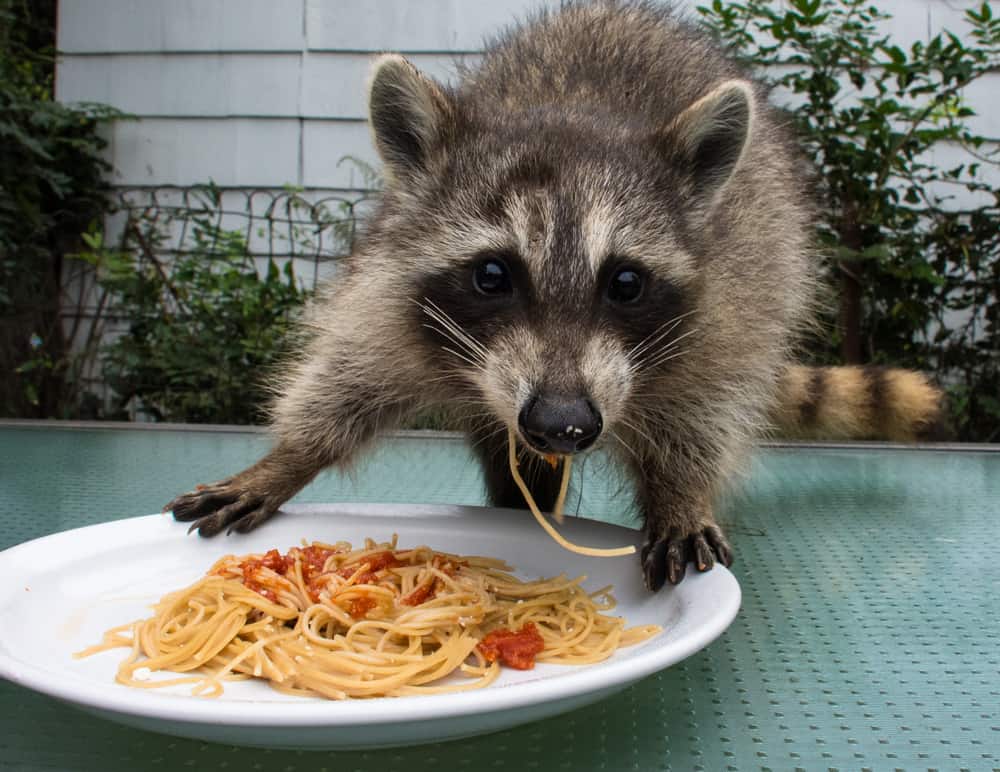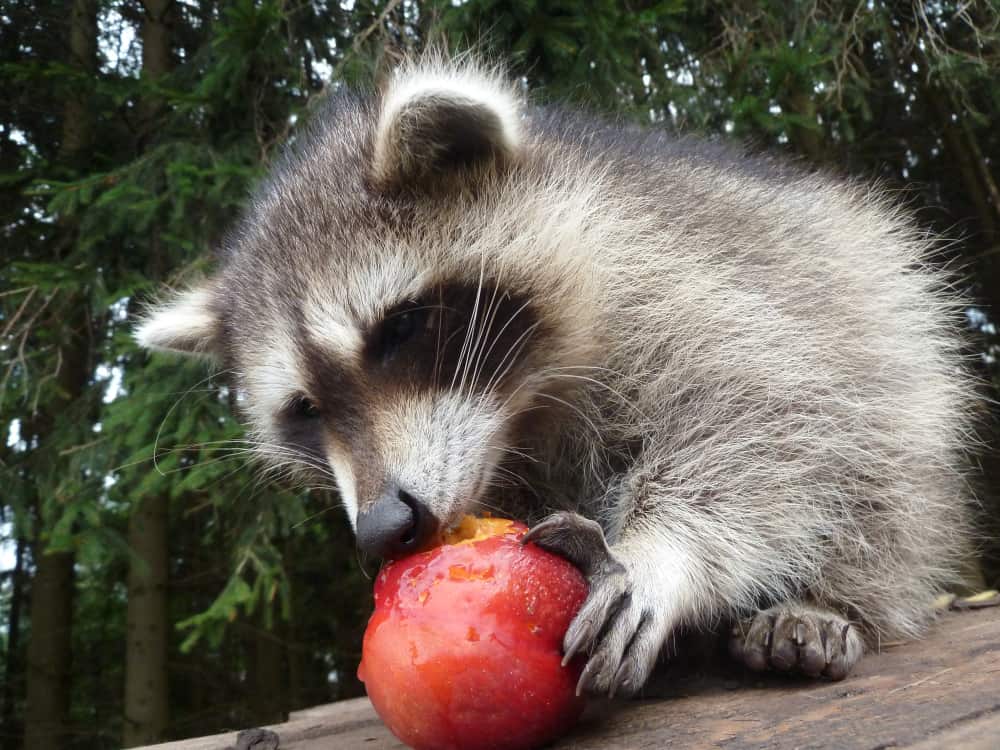Is It Safe to Feed Raccoons
Commonly known as the "masked bandits," raccoons are famed for their mischievous nature. They raid campsites and easily pry the lid of trash cans in search of a meal.
So, what do raccoons eat? Let's dive in and find out.
Raccoons Biology And Habits
Raccoons are omnivores; hence feed on a variety of foods. Their diet includes mainly nuts, seeds, fruits, eggs, insects, frogs, and crayfish.
Being nocturnal, they hunt during the night and rest during the day on high trees away from predators.
As independent creatures, the masked bandits are not known for sharing. After a hunt, they dine alone.
Their forefeet resemble that of human beings with five slender fingers. They are equipped with sharp claws to catch prey on land and in water. These features also come in handy in digging up grass and dirt in search of grub.
In addition, their paws are used for inspecting food and picking away pieces they don't like to eat.
Like human beings, raccoons have incisors, molars, and canines used for biting, chewing, and tearing the flesh of their prey and other food substances. However, they are only known to hunt when the opportunity arises and mix their diets with fruits, nuts, and berries.
Far from being the best predators, these critters tend to go after smaller prey like snakes, frogs, and insects, which is a rewarding source of nutrients.
The scientific name for raccoons is Procyon lotor. Lotor is a Latin word meaning 'to wash.'
If you've come across a raccoon or two, you'll notice that they have a sense of table manners. Before having a meal, they tend to wash their hands or their food. Is it because they are hygienic? Or is it for some other reason? The truth behind this phenomenon is yet to be known.
Initially, they were known solely to live in forests, but they extended their range to urban areas where they coexist with human beings.
Food in urban areas is easily accessible and available throughout the year. For the 'trash pandas' as they are also known, this is a bonus.
What Do Raccoons Eat Most?
Like other omnivores, raccoons feed on a variety of foods. Their diet mainly consists of fruits, plants, nuts, grain, and small prey. On occasion, they are known to venture to areas inhabited by humans in search of a meal.
Raccoons will invade trash cans, compost sites, and even camps to find whatever they could lay their little paws on to fill their bellies. The food items they relish most include:
- Amphibians- frogs are a known favorite and provide the protein required by the critter to survive.
- Fruits- cherries, plums, berries, oranges, and even bananas provide the required minerals and vitamins needed in their diets.
- Invertebrates- worms, mealworms, slugs, and snails are also a good source of protein much needed for their day-to-day survival.
- Insects are also a good source of nutrients and are often easily accessible.
- Eggs- chicken eggs, duck eggs, bird eggs, and any other eggs as they offer a ready source of protein.
- Crayfish is by far one of the most common meals fed on by raccoons. They tend to shelter near water sources where they fish and enjoy this delicacy rich in nutrients. They are a staple diet for raccoons.
- Corn is rich in starch and provides a heavy meal for these furry creatures.
- Nuts- groundnuts, peanuts, acorns, beechnuts are preferred sources of fats and protein.
- Raccoons commonly feed on these to get them through the winter season.
- Birds- tiny birds serve as a filling meal and provide enough protein to get them through the day or night.
- Vegetables such as sweet corn and peas are a good source of vitamin C, proteins, and carbohydrates.
- Poultry- aside from their eggs, chicken also provides essentials required in the raccoon diet.
- Pet food- cat and dog foods are rich in carbohydrates, proteins, and fats that are key for a raccoon's diet.
- Rodents like rats and mice are easy to catch and are rich in nutrients.
- Dead animals/Carrion- readily available, roadkill serves as a readily available meal and requires minimum effort to acquire.
- Besides the above listed, they also feed on other small creatures found near water sources such as turtles, shellfish, and small reptiles.
- Being intelligent and known problem solvers, they don't mind working a bit harder to find food, which is usually satisfactory in the end.
- During spring, the food consumed is stored mainly in their tails that they wrap around their bodies to keep warm in winter.
- Raccoons eat the most during spring and summer as, during winter, they spend the most time in their dens. They may go into a long sleep for several weeks, known as torpor.
- They may lose 14- 50% of their weight in these times as they don't go out as much in search of food.
- Raccoons that visit inhabited areas and may steal food left out for pets or snatch fish from ponds.
These, among many other foods, are a favorite for raccoons to eat. Their capability to adapt to different environments allows them to adjust their diets when the need arises.
Usually, they feed on almost anything they can get their paws on as long as it's easily accessible.
Foods To Avoid Feeding Raccoons

You may ask yourself, "do raccoons have foods that are detrimental to their health?" Well, yes. Like other animals, a lot of foods that humans enjoy are harmful to these creatures. Most of these include junk foods.
Raccoons, like other omnivores, are susceptible to disease or death caused by a variety of foods. These foods include cocoa, coffee, chocolate, onions, garlic, other spices, avocados, guacamole, processed sugars, macadamia nuts, and raisins.
- Cocoa, chocolate, and coffee contain theobromine that causes seizures and may lead to death.
- Onions and other spices contain disulfides and sulfoxides, which cause anemia.
- Avocados contain persin that causes diarrhea and heart congestion.
- Processed sugars, candies, and chips may lead to loss of coordination and seizures. In addition, they may lead to strokes and liver failure, which may lead to death.
- Sodas and artificial drinks contain complex sugars that destabilize their hormonal and digestive system.
- Raccoons have long intestinal tracts that get rid of most toxins in garbage during digestion.
- Also, their stomachs are highly acidic and will kill most harmful bacteria before they have the opportunity to harm them.
- Despite this fact, they tend to avoid rotten foods unless they have no other choice. Hence, they also tend to steer clear of moldy foods.
- Moldy foods may lead to severe illness. Fungus contains neurotoxins that cause vomiting, diarrhea, fever, and attacks among raccoons.
Therefore, when feeding raccoons, kindly avoid giving them these substances that are harmful to their health. Ensure trash is taken out on collection day to prevent raccoons from eating these foods.
Remember, the safety of these creatures is essential as well. It would be inhumane to let these creatures suffer such a cruel fate, regardless of their menacing nature.
Tips To Feeding Raccoons

You require an immense amount of knowledge when it comes to feeding raccoons. Why? Because improper feeding of these critters may have dire consequences. The most common being diabetes.
- Raccoons have to be offered a wide variety of food daily. The food should be rich in protein and supplemented with other nutrients.
- Kits (offspring of a raccoon) take six weeks before they wean off their mummy's milk. The young ones should be allowed to eat all they want in a day. Their diets should only be limited after six months.
- On the other hand, adult raccoons should be fed twice a day. First, in the morning, then later in the evening.
- You can feed them grain-free dog food as a staple diet daily. It can be supplemented with eggs, fish, poultry, fruits, veggies, or prey items such as mice.
- Mealworms, earthworms, gut-loaded crickets, and other invertebrates should be offered as double enrichment if alive.
- Seeds and nuts should be kept as treats and shouldn't be given in large quantities due to their high-fat levels.
- Provide a large dish, preferably shallow, filled with water as they like to dunk their food before eating.
- When feeding them invertebrates like crickets, offer them in a storage box or plastic bag to prevent the crickets from escaping.
- Make feeding time more interesting by placing the food on steps or underneath objects. By doing so, you help the raccoon exercise their brains and body as well.
- Making feeding time a challenge stimulates their brains and keeps them happy and healthy. Such activities also keep them from getting bored and becoming destructive.
- Change their water regularly and feed them in an area that is easy to tidy up.
- If feeding large groups of raccoons, place several plates of food in different spots to prevent them from fighting for the food.
- Stagger their food so that they continue to forage and hunt for themselves.
Improper handling may even lead to rabies as raccoons may not bark, but they do bite. According to Centres for Disease Control and Prevention, they are primary carriers of the rabies virus. So avoid feeding them directly with your hands.
Summary
Aside from being known menaces to society, the "masked bandits" can thrive in whatever environment they inhabit. They are well equipped to haunt, forage and even rob if necessary to sustain their survival. And this is because of their capability to adapt and adjust their diets accordingly.
Source: https://www.atshq.org/what-do-raccoons-eat/
0 Response to "Is It Safe to Feed Raccoons"
Post a Comment